From day dot, our mission’s been to increase awareness of the product marketing role. But, before we could do this, we first had to understand what people already knew about PMMs, so we started a conversation, then we started a blog, and then a Slack channel. Combined, it all blossomed into the PMA community.
So, if you wanna get a feel for how people in the C-suite view product marketing, this is a must-read.
Why are C-suite perceptions important?
By the very nature of the role, product marketing has many facets and, as this varies so much from company to company and industry to industry, the goalposts of the position often end up changing.
We’re keen to help make the definition of the role, level of company influence, and potential career development as accessible and transparent as possible. This way, the importance of product marketing can be properly understood and valued - by everyone.
While there’s no denying product marketing’s journey has definitely grown in recent years and more and more people are understanding what the role’s about, it still has a way to go.
So, in the wake of our State of Product Marketing report - which surveyed 600+ product marketers across the globe to make their job descriptions a little clearer, we decided to take a deep dive into the opinions and knowledge found on the ‘top floor’, after all, they’re the ones with the final say.
A flavor of what’s to come…
Stick with us till the end and you’ll get the answers to all these questions and more:
- How many execs are aware of the product marketing role?
- How do they describe the role of the product marketer?
- How much support do they provide?
- How does this support compare to other internal departments?
- What does the career progression of a product marketer look like?
- In their eyes, what are the core responsibilities of a PMM?
What is the C-suite?
‘C-suite’ usually means anyone with a ‘C’ at the start of their title; Chief Executive Officer (CEO), Chief Operating Officer (COO), Chief Financial Officer (CFO), Chief Information Officer (CIO) (you get the drift).
How was the sample split?
As part of our investigation, we’ve surveyed 173 execs from all sorts of industries and companies - big and small - to get a good idea of where the role of the product marketer is best utilized, and where it’s maybe more undervalued when PMMs are engaging with the C-suite.
Here’s how the sample of PMMs has been broken down into groups as part of our investigation:
Job title
There was a fairly even split of Chief Product Officers (21%), Chief Marketing Officers (20%), and Chief Executive Officers (24%) among our respondents and the next biggest clusters were Chief Revenue Officers (11%) and Chief Operating Officers (7%).
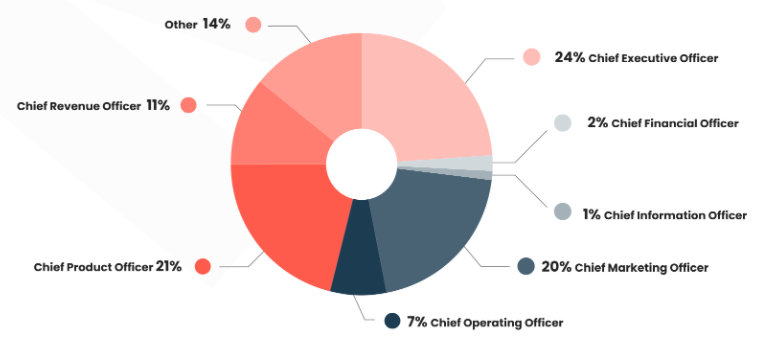
Sector, product, and stage of growth
Perhaps unsurprisingly, the majority (59%) of the execs we spoke to serve the B2B sector. Of the remaining two-fifths, just 9% said they worked in B2C and the rest (32%) said both.

The type of product their company sells didn’t buck the trend either. Most of the C-suites we spoke to came from SaaS, with only 13% selling physical products - these percentages very much mirror the splits we saw in our State of Product Marketing and Product Marketing Salary surveys.

In terms of organizational size, everyone came from companies at a reasonably even mix of growth stages, with early post-product market fit just pipping the largest category at 27%.

And finally, when it came to money, exactly half of the people we spoke to were at companies with annual revenue of less than $10 million, and the next largest segment (20%) were companies in the $10 - $50 million annual turnover range.
Just 6% of the execs we spoke to worked at companies with annual revenue of over $ 2 billion - in comparison, 13% of the PMMs who completed our Product Marketing Salary Survey said they worked at a company with that sort of revenue stature.

Learn more about the essentials needed to reach the upper echelon on the product marketing ladder, during our 8-week course packed with 40+ hours of education, 14+ templates and frameworks, exclusive alumni, and much more.
Register now
Product marketing pervasiveness
The first thing we got to work on understanding was how prominent product marketing is in the C-suite. We know it exists, you know it exists, but did they?
So, to dig into this, we started by asking “Does your current company have a product marketing function?” and six in 10 said ‘yes’.
Of the execs who don’t currently have a product marketer, more than three quarters worked in companies that turnover less than $10M a year, which begs the question, is it just because of budget?
As any PMM knows though, the role of product marketing is instrumental in shaping products, defining markets, and finding product-market fit. Elizabeth Brigham, Head of Product Marketing (Software) at Morningstar, summed up the why behind this superbly:
“There are quotations out there that say anywhere between 80 and 90% of new businesses fail, whether that's a startup or whether that's a new product line or new business you're choosing to launch with an existing company. Some of those reports went back and asked CEOs or others within the C-suite, well, why do you think you failed?
“The number one answer that comes back is product-market fit. The way I kind of break that down is by saying, well, you've got a product and a lot of people might think ‘this is the cool new shiny thing’ and a lot of times what I've seen, especially in smaller, more nascent companies, is the founder or the person who built it had that problem and then tries to go find a market, whereas product marketing actually assesses the market, assesses what sort of core competencies that organization already has, and then pulls that empathy and that understanding of the market into what should we go build, because we fundamentally understand there's an acute pain point going on here for which people are willing to pay for a solution, and that is truly the value that a product marketing manager brings to the table.
“It's taking down the risk or lowering the risk of investing a lot of money, whether it's in people or product development or acquiring something new, and de-risking that investment, and so I think that would be a fairly compelling argument to any C suite executive, especially at smaller companies, but even in larger, more established companies who are thinking about how to allocate their assets maybe for the coming year.”
Next, we asked everyone who said they don’t currently have a product marketing function “Are you aware of the product marketing role?” and reassuringly, the vast majority - nine out of 10, to be precise - did.
However, that still means 10% of those execs do not know the product marketing role exists. Which is one in 10 too many. Of those that said they hadn’t heard of the position, half were CEOs and the remaining 50% was made up by CMOs and CROs.
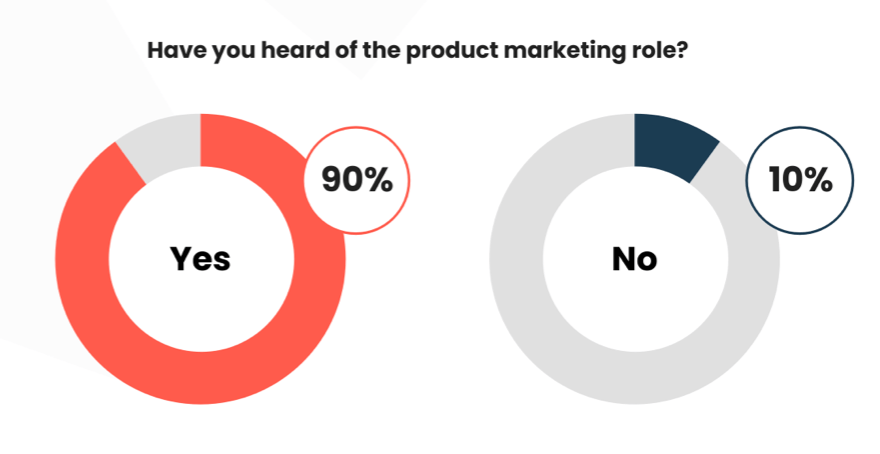
Quick Q&As
We caught up with Joshua Fredericks, CEO at Alpha Dot Net Australia Pty Ltd, who doesn’t currently employ a product marketer to pick his brains.
Q: How would you describe the role and value of a product marketer?
A: "A Product Marketing Manager’s job is to look at the particular product they are working on and design marketing strategies to promote the why what and when of the product to the marketplace."
Q: What other positions would you fill before that of a PMM? And why?
A: "Direct sales roles. With the products we have at the moment we are looking at more targeted strategies in smaller geographic areas. Relationship building is of primary concern."
We also spoke to Sunny Dhami, Senior Director, EMEA Product Marketing & GTM at RingCentral, about the findings.
Q: How do you feel about the fact 41% of the execs said they don’t have a product marketing function, and of those, 10% don’t know what it is?
A: “These stats are a mixed bag, to be honest, I'm not surprised at the 41% of C-suiters not currently having a PMM function within the business currently as I still feel that product marketing is a relatively new function within organizations, it can be found more often in technology companies and these have been the driver for this function within businesses.
“The second stat surprises me more, 10% of these were not aware that the product marketing function even exists, I find this surprising considering how much of an impact product marketing can have within a business. But then there are also a number of functions that overlap with the core product marketing functions such as solutions marketing, go-to-market, and propositions marketing to name a few, which would all sit under a product marketing function. So perhaps they do have some elements of product marketing without even knowing.”
Q: What do you think product marketers can do - collectively or individually - to increase awareness of the role?
A: “I think the work the Product Marketing Alliance is doing to up-level communications around the function and its capacity is great, but I also think we as individuals can help share the great work coming from within our functions in our own organizations. At RingCentral, the product marketing function continues to grow and deliver more and more which we are sharing both internally and externally.
“Product marketers in nature aren't reserved so sharing our collective successes will raise awareness and questioning those businesses that don't currently have the function as to how they deliver on outputs we would generally see coming from the product marketing team.”

The past and the future
Having dug into the present, next, we wanted to look at the past and future. So, we started by asking every single exec who knew what product marketing was, but didn’t currently have one on board, if they’d worked with product marketers in the past.
And most of them said yes.
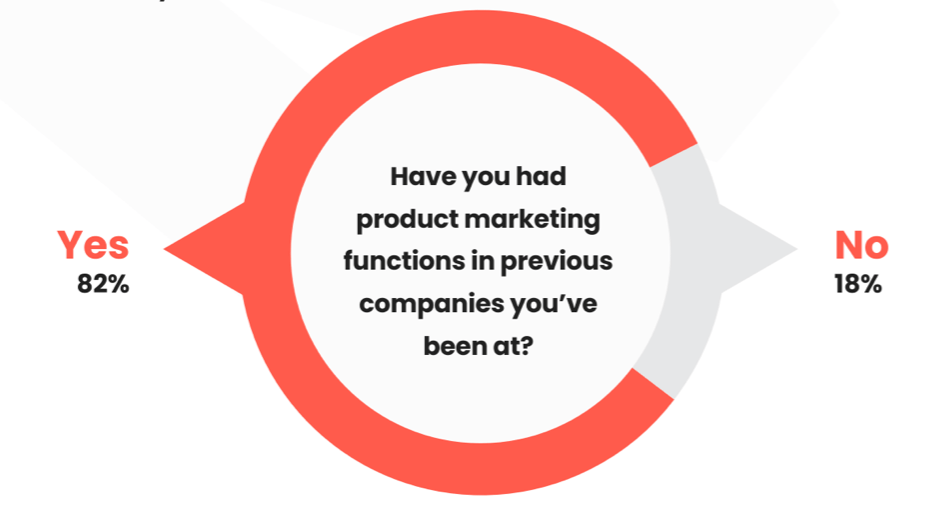
Not too bad, right? But what do the next 12 months look like? Let’s explore.
Three in 10 (31%) of the execs we surveyed are planning on implementing a product marketing function in the next year or so. Slightly more (36%) said they were unsure and bang on one-third gave an outright ‘No’.
Of those who had no intention of recruiting a product marketer in the near future, again, most were from organizations with annual revenue of $10M or less.
On the flip side, of the 31% of C-suites who said they want to hire a product marketer in the next year, almost half (47%) were early pre-product-market fit, and around one in four (26%) were early post-product-market fit.
Defining product marketing
Defining the role of product marketing is no easy feat. Even us product marketers have different definitions. But we wanted to know what the definition looked like through the lens of the C-suite - so we asked just that.
More than half (57%) of the execs described the product marketing role as:
“Product marketers represent the voice of the customer before, during and after launch to drive growth, profit and satisfaction.”
Around one quarter (26%) said:
“Product marketers support the marketing and sales functions by creating various types of collateral and assets.”
And 12% had the definition down as:
“Product teams get products on the shelf, product marketing teams help get those products off the shelf.”
Of the responses that fell into the ‘Other’ category, some of the individual comments included:
“Product marketing helps give voice to the product vision put together by the product team, leverage that voice to help the sales organizations better execute their roles, and determine and drive the outward facing presentation of the product both physically and digitally.”
So, how do these definitions compare to how product marketers describe the role? Let’s take a look.
“The glue that brings disparate stakeholders together. We create scalable, personalized customer experiences to drive growth, profit and satisfaction.”
Alicia Carney, Global Product Marketing Manager of Growth at Deliveroo
“Product marketing is responsible for the customer journey and what message is presented at each part of the journey.”
Aaron Brennan, Director of Product Marketing at airSlate
“Product marketing is responsible for taking a product or solution to market by building the Go-To-Market strategy and driving its execution via differentiated product messaging and launches, thought leadership and awareness, demand-gen support as SME and sales enablement.”
Anand Akela, Product Marketing Leader at Nutanix
“The role and value of product marketing is to express the distinct value of our solutions to customers. Expression of value.”
Carol Carpenter, VP of Product Marketing at Google Cloud
Strategic vs tactical
Sticking with the definition theme, we went one step further and asked the execs to put the role of product marketing into one of three boxes - strategic, tactical or support.
And the results were…
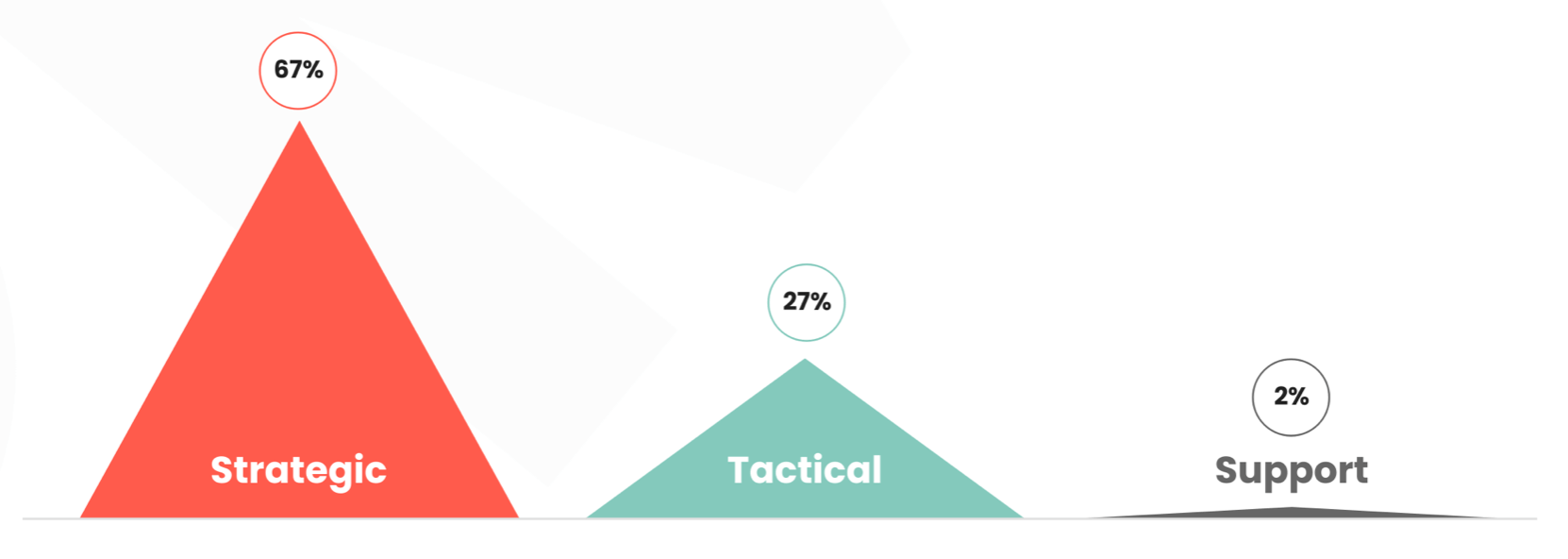
We should probably mention, the only reason we included ‘Support’ in there was to test the waters. Hopefully, it goes without saying that here at PMA, we categorically do not see product marketing as a support function, but we wanted to know if those at the top did. Fortunately, very few did.
“Product marketing is a strategic function that bridges the gap between production (engineering) and market.”
Quick Q&A
We asked Sarah Din, Director of Product Marketing at SurveyMonkey, why she thought some execs see product marketing as simply a ‘support’ role:
“Considering that product marketing is still a fairly new function to a lot of organizations, that is actually not a bad statistic in my eyes. If you had asked that same question a year ago, I bet the number would be a lot higher! But it also shows that we still have some work to do in changing the perception of product marketing’s role in an org. My hypothesis is that this is more of an issue in smaller, less mature organizations where there isn’t a clearly established product marketing org, and they likely do function as more of a support role.
“One of the key areas of focus for PMMs is product launches (and truly GTM strategy). But instead of seeing it as an actual GTM strategy, if the organization treats that process as more of just a “product or feature launch” then the role of the PMM really becomes more of a support role.
"In that scenario, the PMM often has no voice in the early stages of product development, and they are not really involved in thinking through the broader strategy of how to take something to the market (which is a lot more involved than just running a launch campaign). So, in my opinion, if the broader perception is PMM = product launches, then you tend to get put into the more tactical, support bucket.”
Q: How can we change this perception?
A: “I think to be known as a strategic function, you have to simply show up as a strategic partner. Approach things with a focus on the short-term but with a vision of the long-term strategic goals. Bring data to the table - data that others may not think about or have access to, such as “the voice of your customers” and provide something of value to get a seat at the table so to speak. And lastly, educate and build awareness. Especially if you lead the product marketing function at your org. Product marketing is still fairly new to a lot of companies, so I think it is our job to explain to others what value we can bring, and how we can and do help our cross-functional partners in different areas of the business.”
Q: Do you think the opinions of the executives in your company significantly affects the impact you can have as a product marketer?
A: “Yes and no. Yes, because if your executive team believes in the value of product marketing, they will a) hire PMMs early in the process of growing a company, and b) advocate for product marketing to be part of key decisions. So, in that sense, yes - you need their leadership and guidance to be successful in an organization and to have an impact.
“BUT, I also say no because if you don’t have that in your organization, it is your job as a PMM leader to build that awareness and change that perception. A lot of that is about educating them (and your cross-functional partners) on what your role actually is - you have to advocate for yourself and make sure that you are part of key decisions that will help you make a bigger impact.”
What are the responsibilities of a product marketer?
Next, we asked the execs what they thought a product marketer’s main responsibilities are, and to provide a like-for-like comparison, we gave them the exact same multi-choice list as we did in our State of Product Marketing report.
So, through the eyes of the C-suite, a product marketer’s main responsibilities are messaging and positioning. Phew. That aligns with what PMMs say. Second and third in importance, according to the execs we spoke to, were ‘managing product launches’ and ‘customer and market research.'
Here’s a more detailed breakdown of how the executives ranked product marketing’s responsibilities, versus how PMMs rank them:
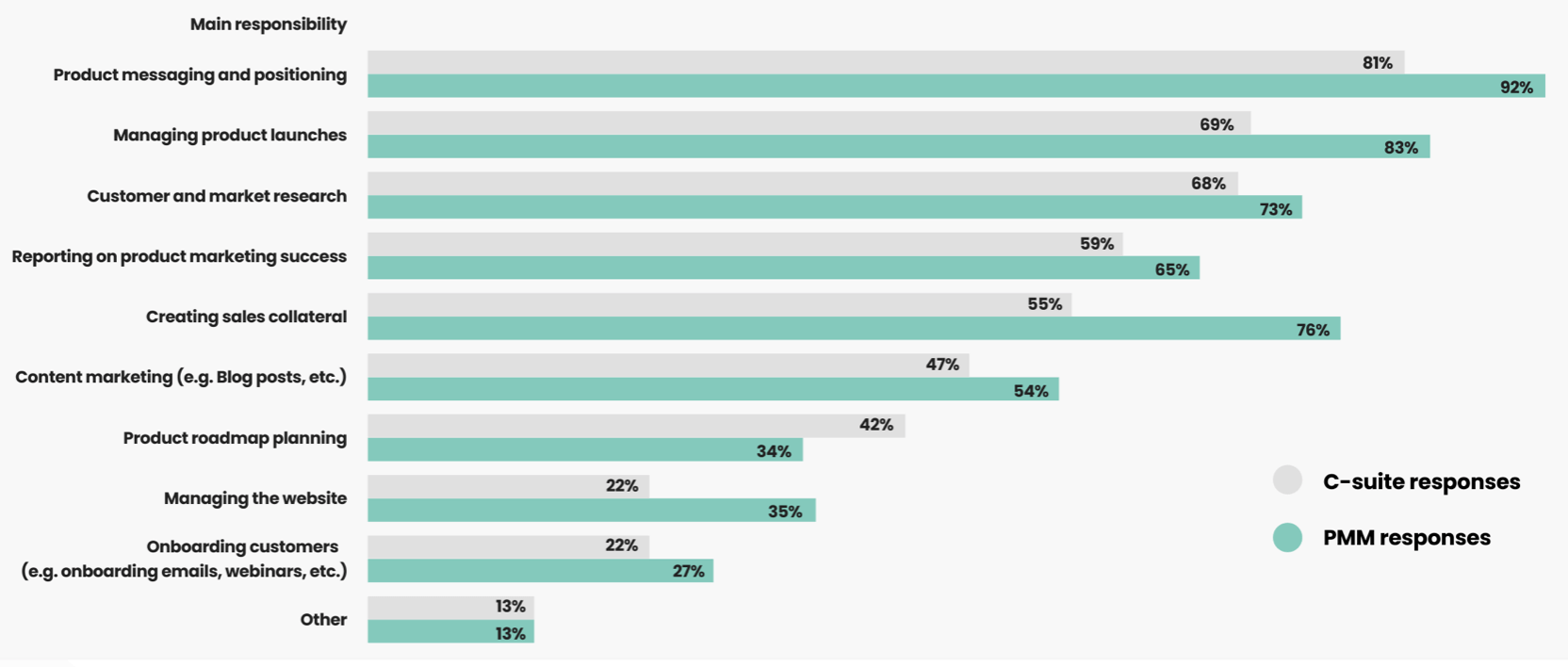
The results aren’t a million miles apart but there are differences and there’s certainly space for closer alignment.
Quick Q&A
We caught up with Virginia Diego, a Senior Product Marketing Manager at CARTO, to get her thoughts.
Q: What are your thoughts on the variances shown?
A: “I think the variances between how C-suiters see the product marketing function and what product marketers actually do reflect how the breadth and depth of the role is not completely well understood, and how the function lacks visibility in many organizations. As product marketers, we should be proactive in communicating what we do to foster transparency and accountability. This is particularly relevant for such a cross-functional role.
“Oftentimes, product marketers work in the shadows influencing and laying the groundwork for other teams to come in and execute successfully. For example, digital specialists and demand generation marketers can't be successful with the wrong positioning, messaging, and go-to-market strategy - and that comes from the product marketing function. So even if as a PMM you may not be measured against lead volume and quality, your work is going to drive a lot of that.”
Q: How do you think PMMs can create closer alignment between the C-suite's perspectives and product marketers’ reality?
A: “Very interestingly, C-suiters seem to think of Product Marketing as one of the product roadmap drivers while we often hear this is a pain point for several PMMs who think they don't have enough influence on what gets built. This perception can be an opportunity to help product marketers make a stronger case to get a seat at the product table and position themselves as key contributors to their company's product strategy. At the end of the day, our role is not only communicating a story outwards but also building those narratives from the product's inception.”
What is the value of product marketing?
The value of the role is undisputed, and 98.2% of the execs we spoke to said they understood the contribution product marketers brought to the table. We took a deep dive into this and asked the execs how product marketing contributes to the overarching objectives of their company.
For this one, we gave five options:
- Being the voice of the customer at all times
- Making sure sales have what they need to sell
- Bringing in revenue from both new and retained customers
- Creating personalized customer experiences
- Helping marketing put their collateral together
Fortunately, more than half of the execs said product marketers contribute through all of the above. However, there were a few that limited a PMMs input to just ‘helping marketing put their collateral together’.
Quick Q&A
We asked Martin Aguinis, Global Head of Marketing at Flutter, Google, where he thought PMMs might be most undervalued, and why:
“In the ability to craft clear and strategic messaging. Since anyone can create a presentation deck or talk about a product, the value of storytelling may not be obvious at first. However, high-performing PMMs have an exceptional ability to fully understand the product, market, and audience; it's the heart of what we do.
“This knowledge can transform a product since it results in better communication to other internal roles like PM, Sales, and Eng teams on what customers want and a better external display of the product or service to your end-users.”
Let’s take a look at communication
Our next focus point was communication. Product marketing’s a highly collaborative role and when we speak to PMMs and ask what they think the #1 skill a product marketer must possess is, without a doubt, communication always comes up.
But what do the C-suite:PMM interactions look like, we wondered, so we asked:
How often do you directly interact with the product marketing team?

Thankfully, not a single respondent from the C-suite checked the ‘Never’ box.
We’ll go into more detail on the support side of things later, but one thing we did notice is the less frequent an exec was in contact with product marketing, the less support they gave them full stop.
What is the C-suite and product marketer relationship like?
So, we know folks from the C-suite chat with PMMs on a regular basis, but do they invite us to leadership meetings?
For the most part, yes. Two-thirds (67%) of the execs said product marketing’s always present in leadership meetings, around a quarter (24%) said PMM’s there sometimes, and 9% gave a flat-out ‘No’.
Quick Q&A
We asked Parag Pathak, Teal Lead, Product Marketing over at IBM, what his thoughts were on product marketing’s presence - or lack of it - at the table.
Q: Why's it important for product marketing to be brought into leadership meetings?
A: “Product Marketing brings a unique perspective to the table that no other function can. We interact with and understand our customers, prospects, analysts, product managers, sellers and engineers, which gives us a unique viewpoint on both the external market and internal roadmap. Product Marketing can also help leaders better understand the competitive landscape by analyzing the competitors' go-to-market strategy, instead of focusing on just feature-to-feature comparisons.”
Q: For product marketers who aren't currently getting that insight/level of input, what can they do to get that seat at the table?
A: “PMMs that aren't getting a seat at the table are either not contributing value to the organization and the leadership team or their organization just does not value product marketing. Find innovative ways to add value - great examples include customer win/loss analysis, analyst briefings and relationship-building, uniting the company via a messaging and positioning framework, sales enablement and relationship building, buyer personas and so on. By doing so, other cross-functional leaders will invite you to the table knowing you know the industry and the customer, and that you can add value to the business.”
...which leads us nicely onto the support side of things.

How much support do we get from above?
Product marketers rarely - if ever - work in isolation. Sometimes we rely on Product, others Sales, others again Customer Success, and oftentimes all three - plus more. And, of course, we rely on people from the C-suite too.
So, looking outside in, how much support do execs say they provide to the product marketing function?
Overall, the average was 8.5 out of 10. Could be better, could be much worse.
Quick Q&A
We asked Meg Scheding, a Strategic Consultant for Startups, for her take on the numbers.
Q: What are your thoughts on the disparity between the support C-suiters say they give, versus what product marketers say they get?
A: “I would say this is a common disparity between business divisions and the C-suite. Having been a product manager in a former life, the common perception from PMs was that the C-suite didn’t provide enough support or resources to the product org, either. I would say it’s an eternal problem between folks in the trenches and the C-suite, and only the most enlightened C-suite ever truly supports lower divisions.”
Q: What kind of problems can a lack of support cause for product marketers?
A: “If the role of the PMM is not fully articulated and valued by the C-suite, then the rest of the org (especially marketing, product management, and engineering) will also not view it as a valuable, essential resource for the company. That trickles down into every aspect of the PMMs role - funding for projects or staff, clearly delineated swim lanes for cross-functional/matrixed teams, and dissatisfaction that will lead to good folks leaving the org.”
Q: What do you think we can do to tighten up that support alignment?
A: “Continue to publish our guidelines and definitions and best practices around the role of product marketing, especially in a larger org where there is more overlap with adjacent divisions, which can lend itself to cannibalization of resources/support.”
How much influence do C-suite executives have?
In our State of Product Marketing report, we asked 600+ product marketers how much influence they feel they have in their company and the average came in at 6.9/10.
Once again, we went for a like-for-like comparison and put a similar question to the C-suite: On a scale of 0 to 10, how much influence would you say the product marketing function has at your company? And overall, the response was slightly better: 7.6.
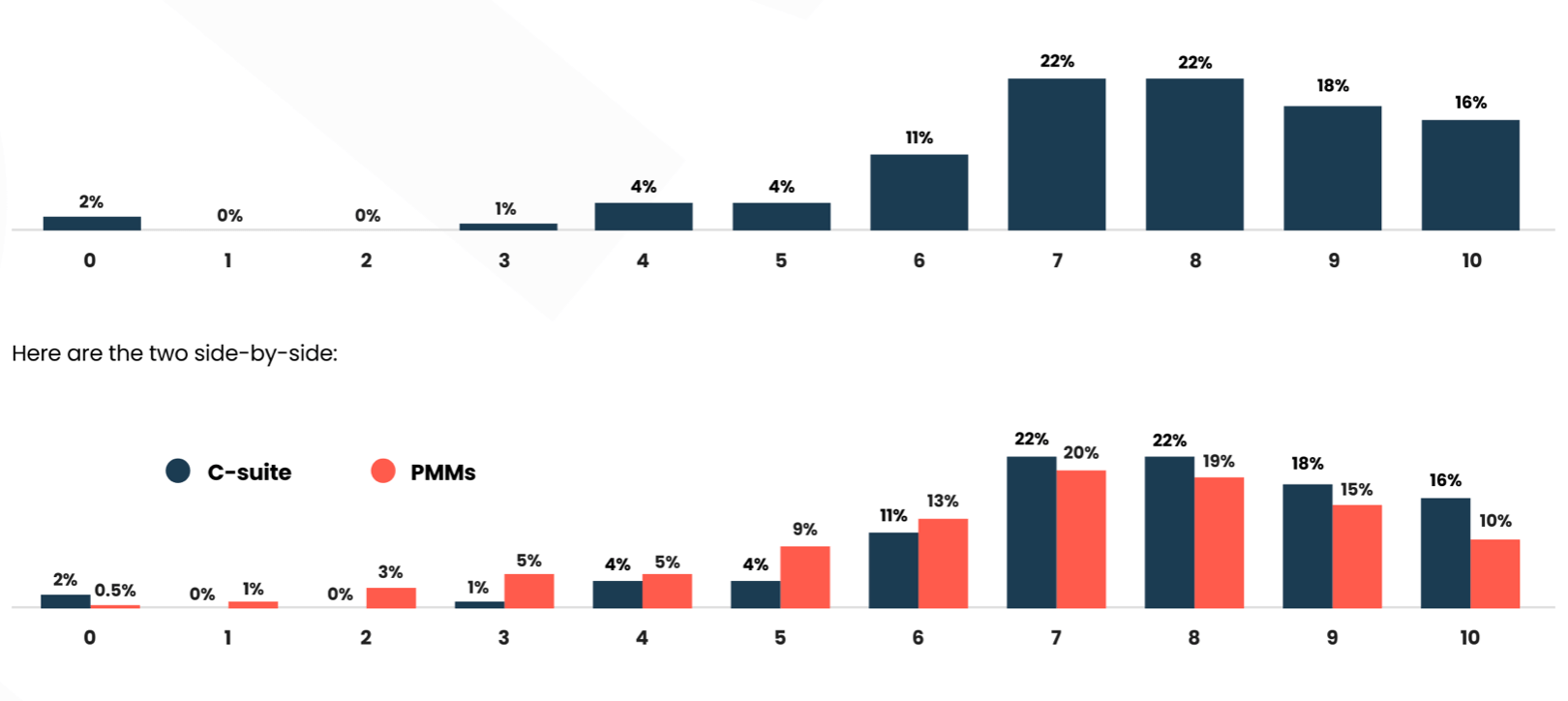
Of the execs who said they give maximum support, three in 10 (29%) were CPOs, one in five (22%) were CMOs and 17% were CEOs.
Who should product marketing report to?
We see this question asked a lot in the community and every time, it draws a bit of a blank. Some people report to Product, others Marketing, and then a select few to something else.
In a bid to bring more clarity to the question though, in 2019’s Product Marketing Salary Survey, we asked 1,600+ PMMs who they report and the majority (73%) said Marketing, and one in five (19%) said Product, and 5% said Business Development.
So, that’s the actual reporting structure, but do the C-suite agree?

Sort of. While Marketing still came out top, the percentage wasn’t quite as compelling and there was also a sizable chunk who believe product marketing should feed directly into the CEO - of that number, 35% were CEOs themselves.
Out of the one in five execs who said PMMs should report to Product, 55% were CPOs and on the flip side, just one-third (36%) of those that said Marketing’s the best department to report to was CMOs.
If you’re a PMM reporting to Marketing you might want to close your eyes for the next quote, but someone from the C-suite had a rather strong opinion on this:
“Product marketers are useful if properly trained and reporting to Product. They’re useless when reporting to Marketing.”
What happens next?
The last thing we wanted to look at was what the future of a product marketer looks like. We know what the ladder looks like internally:
Associate Product Marketing Manager > Product Marketing Manager > Senior Product Marketing Manager > Director of Product Marketing > VP of Product Marketing.
But what are the prospects after that VP pinnacle? How much further can a product marketer climb? Or will the position be given C-suite status itself, in time?
Let’s see.
What we asked: In terms of progression, which direction do you see senior/director/VP-level product marketers advancing in?
What they answered:

Personally, we were pretty pleased with three in 10 of the C-suiters saying VPs of Product Marketing will soon form part of the executive leadership team. Let’s see what Elizabeth Brigham, Head of Product Marketing (Software) at Morningstar, thought:
Quick Q&A
Q: What do you think the progression of a product marketer should look like?
A: “I think the most natural progression for a director/VP PMM is to run a business in more of a General Manager capacity.
If you look at comparable roles in say, consumer packaged goods, brand management roles are effectively PMM roles - they're responsible for the marketing strategy and an intense focus on the customer and product-market fit. Generally, we see them going into a general manager/business unit owner path, and I would see the same for SaaS/tech PMMs.
“I also find it fascinating that somewhere along the way in the history of SaaS, someone decided to break up the core marketing strategy 4Ps - Product, Price, Placement, and Promotion - into PMM, Demand Gen, and Product Management, whereas in traditional marketing roles the marketer owns all of that. It would be fascinating to chart a history there to see where the divide happened.”
Q: Three in 10 of the execs said VP of Product Marketing will soon form part of the executive team, what do you think we can do to a) speed this up, and b) increase the percentage so more people in the C-suite believe PMMs belong there?
A: “I think it really depends on the size of the company and structure. I’m a VP of PMM and I have a seat at the exec level of my business unit, but it’s within a $1B company with seven business units. There’s a level between me and our CEO, so I’m technically not on the ELT of the company.
“In smaller companies (maybe the $100M-$500m size) I think that the VP of PMM should position themselves as a way to help the company make smarter investments and de-risk the development of new products, namely by being an expert on the market, potential clients and existing clients, competitors and the company’s moat, or unique value. By taking a more business and finance-focused approach, I think the VP of PMM or just PMM, in general, would be a critical part of the exec team.”
A few closing quotes
We’ll leave you with a few final words from the C-suiters themselves. We concluded the survey by asking each exec for their thoughts on the role and value of product marketing, and here are all the unadulterated responses we received.
“Product marketing plays a critical role when used appropriately. It plays a critical role in how we present products for sale and the sales process. The product marketing manager must be able to clearly communicate technical and complex details to non-technical consumers. It's a challenging role that is often misunderstood.”
“Product marketing’s critical to any firm's success but too often under-invested and excluded from key Go-to-Market discussions.”
“Product marketing’s impact on the company is understated in most companies. That said, "marketers" have a reputation for being graphic designers, social media posters, and general cost centers. If marketing is merged more strongly with the product, you get a better product.”
“The role is to promote and sell products to the customers. The value is the product/brand awareness to the customers.”
“Priceless. Happy customers = repeat business.”
“Critical. Several companies I know have amazing products, but the sad thing is not too many other people even know they exist.”
“I take issue with the split of product marketing as a silo from the rest of the marketing mix. It is not separate. Call it 4 Ps or 7 Ps - whatever framework you want. Net, it is shortsighted to build political fiefdoms across the marketing mix. Customer's UX is not segmented. Segmenting marketing into independent autonomous functional silos may facilitate the management, but it is an operational artifice that often undermines UX/business success in enterprise organizations.”
“Product marketing is critical to the success of any company.”
“Product marketing is a strategic function that bridges the gap between production (engineering) and market.”
“In a SaaS company, product marketing is very strategic and critical to the success of the company.”
“Exceptionally valuable.”
“Product marketers have a pulse on our customers and their needs and create products to fill those needs. They are responsible for creating or sourcing the ‘pain killers’ for our customers ‘aches’. The more effective the ‘medication’, the more successful the product will be. The best solutions need very little ‘marketing’ on the back end because they almost sell themselves or are successfully sold by word of mouth.”
“It should own the customer journey, co-ordinate the go-to-market plan, map content and engagement to the buyer journey broken out by main persona groups (economic buyer, champion, influencers), and drive messaging content for moving buyers through 'land' and 'expand'.”
“Product marketing is a critical and forward-facing role for aligning products and product messaging with customer needs.”
“PMM is a critical part of the marketing and sales functions - it enables other specialists to focus on demand-gen, content, web, etc.”
“Product marketing is critical to company success.”
“Vital for success.”
“It is the core of the marketing strategy! Without it, how would we connect our products to the customers? How would we know which markets to tackle? How could we understand the stories that resonate with customers?”
“Before moving into a CMO and CCO role, I spent a good bit of my career in product marketing so I have built a commercial team that depends on the work of a product marketing team and their relationship with product management (representing all of the functions that sell and build respectively). Our success depends entirely on the effectiveness of our product marketing team.”
“Invaluable.”
“The role is vitally important and it should be the most senior function of our marketing org.”
“I find the role essential to drive growth, own market and customer data and be the voice of the customer. Along with positioning and product-focused marketing support, I don't believe you can effectively run a strong product function without a strong product marketing team.”
“I think every SaaS company defines and ultimately utilizes product marketing in their own way - I have seen flashes of brilliance at Salesforce where there is true synchronicity between product, marketing, product marketing, sales and success, but it was the exception, not the rule. There’s no question product marketing needs to have a larger voice but they also need to own a growth metric so greater, ongoing collaboration is realized.”
“Without product marketers, we only have hypotheses. Product marketers ensure that we have data-driven conclusions that we use to drive results for our business and our customers.”
“Product marketers help drive the future vision and current revenue.”
“Product Marketing is an important role but in technology companies, the role of product marketing is nebulous as there is a significant overlap with Product Management. Additionally, most product marketers do not function independently and always need help from other functions such as Product Management, Marketing, and others. There is value in Product Marketing but companies need to solve the problem of organizing the teams appropriately and empower them with a charter.”
“Brand and product communication is very important to creating value and interest from consumers. As long as the product or brand is truly differentiated and seen as a robust product, it will get very good traction through the traditional media, social media, and digital media in communications to consumers.”
“Product marketers are valuable as long as they have direct access to decision-makers.”
“Product marketing is valuable but the role needs to expand. We need better, holistic marketers.”
“I've had the good luck, as CPO, to manage product marketing a couple of times. The PMM function can be unbelievably powerful. PMs tend to focus on the engineering function and getting things built. PMMs focus on the GTM side of the organization. When the two individuals are paired together and form one real team, they are formidable. Ideation and high-level strategy are always a shared burden (and honestly, often influenced by higher-ups in the exec team). This is why I hesitate to call either PM or PMM in isolation "the voice of the customer". In this partnership, PMMs can orchestrate teams like Sales and Marketing, getting the entire organization capable of weaponizing the work that product and engineering do. When two people in these roles really respect each other and share in developing the overall roadmap, they can be truly formidable. I have seen partnerships like these re-center organizations around them (rightfully). It is rare to find individuals who can balance technical awareness and product detail with customer empathy and market awareness. The PM/PMM duo is a structure that can combine the best of both worlds.”
“Product marketing is the art of maximizing the value and awareness of your brand and product mix.”
“Sales needs direction otherwise they will send out contradicting messages to our customer base.”
Conclusion
The results from this report captivated us from start to finish and on the whole, we’d say they’re fairly positive.
Since our inception, our mission’s been to elevate the role of product marketing and raise awareness not just among the C-suite, but across the board. So with that said, our aim for 2021’s edition is to ensure not a single C-suiter’s able to say they’re not aware of the PMM position - that’s one area for improvement.
Other key takeaways for us were:
Buy-in and support from the C-suite is decent - but it could be better. For product marketers - or anyone, for that matter - to perform to the best of their ability, they need support. Buy-in from the top filters all the way down to the bottom and so although an average support rating of 8.5/10 isn’t horrendous, it could, of course, be better, and so we’ll be keeping an eye out for that next year.
Execs perceive product marketing’s influence as higher than PMMs. What was most interesting to us about this was the difference in opinion. The execs say product marketing has an influence level of 7.6/10 within the company, whereas product marketers have it down to 6.9/10. As time goes by, our utopia vision is:
- Both execs and PMMs give a higher rating
- Closer alignment across the two
Leadership meetings should involve product marketing. Our results uncovered that almost one in 10 product marketers aren’t invited to leadership meetings - and that’s a problem. A PMMs value is prominent throughout every stage of a product’s lifecycle - including early-stage talks, of course - and if they’re not provided with the foresight and insight needed, they’re not being set up for success - and nor is the company.

